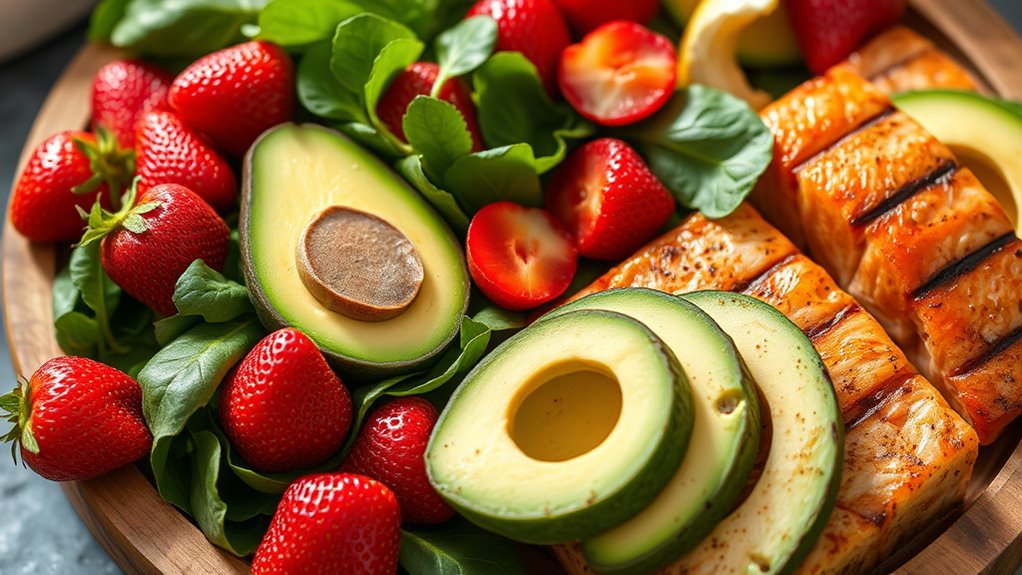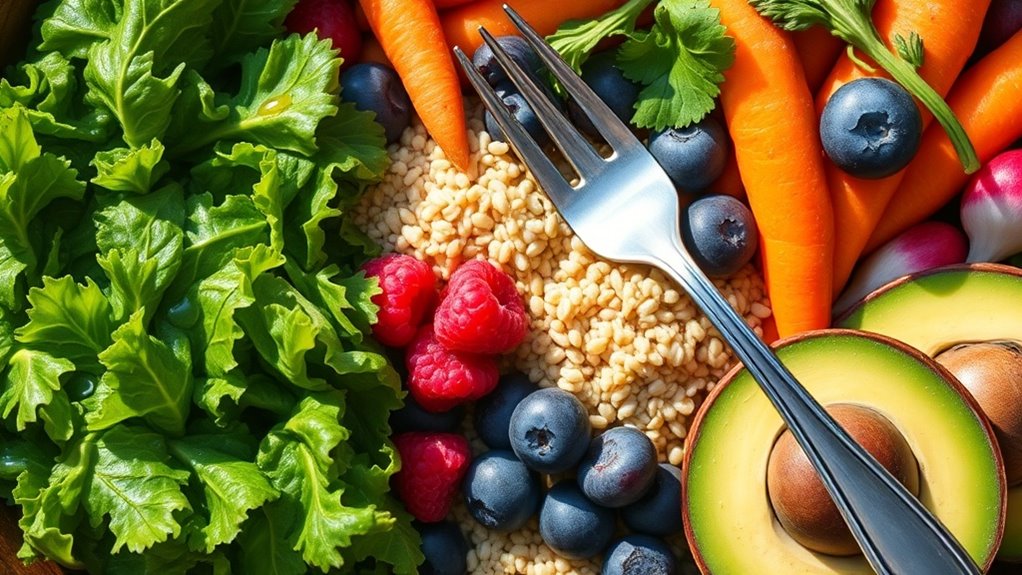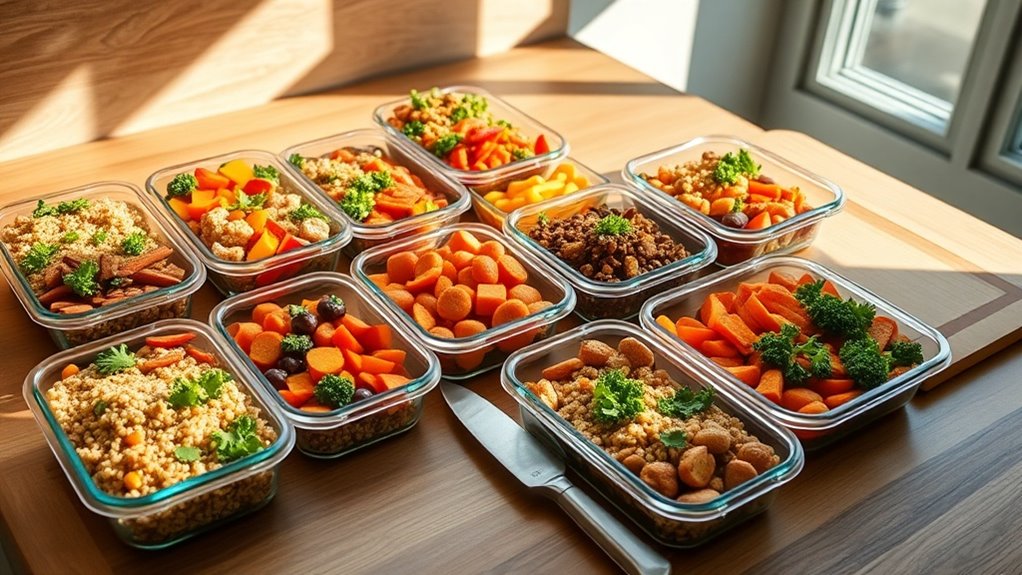Are You Eating the Right Foods. Top Nutrients for Effective Weight Loss!
If you’re gently reshaping your figure, start by focusing on lean proteins like eggs and fish—they keep you fuller longer and support muscle repair. Don’t overlook fiber from broccoli and apples to tame cravings and steady blood sugar. With healthy fats from avocados boosting your energy, you’ll want to explore how vitamins and minerals seal the deal for lasting results.
Key Takeaways
- Prioritize protein sources like lean meats and eggs to enhance satiety and support weight loss.
- Incorporate fiber-rich foods such as vegetables and fruits to reduce cravings and stabilize blood sugar.
- Add healthy fats from avocados and nuts for sustained energy and improved satiety.
- Include vitamins like B6, B12, and D from whole foods to boost metabolism and fat breakdown.
- Ensure adequate minerals like magnesium and hydration to optimize fat metabolism and appetite control.
The Importance of Protein for Satiety
Protein plays a key role in satiety, helping you feel full longer by stimulating hormones like GLP-1 and PYY, which curb appetite and make weight loss more achievable.
To boost this effect, prioritize nutrient-dense foods rich in protein, such as lean meats, fish, eggs, and dairy.
These options provide high-quality protein that supports muscle repair and metabolic health without adding unnecessary calories.
Evidence from studies shows that consuming adequate protein—around 1.2 to 1.6 grams per kilogram of body weight—enhances fat loss while curbing hunger.
Actively incorporate these into your meals to sustain energy and achieve your weight goals effectively.
For even greater benefits, consider combining protein sources with high-fiber foods to maximize satiety and maintain steady energy levels throughout the day.
Fiber-Rich Foods to Curb Cravings
You know that adding high-fiber vegetables and fruits to your diet effectively curbs cravings by promoting fullness.
Research shows these foods, such as broccoli and apples, slow digestion and stabilize blood sugar levels to prevent overeating.
Start incorporating them into your meals today for practical, lasting weight loss results.
For added benefits, consider including whole grains like quinoa in your meals to provide more fiber and sustained energy.
High-Fiber Vegetables
High-fiber vegetables, such as broccoli, spinach, and Brussels sprouts, effectively combat cravings by promoting satiety and stabilizing blood sugar levels. You’ll feel fuller longer, thanks to their low-calorie bulk, which research links to reduced snacking.
For instance, steaming broccoli or adding spinach to salads keeps meals nutrient-dense and satisfying.
Incorporate them daily—aim for at least two cups—to support weight loss goals. Studies show these veggies enhance gut health, further curbing hunger hormones.
Make them your go-to side; it’s a simple, evidence-backed strategy for lasting control over cravings. Stay consistent, and you’ll see results.
Fruits for Cravings
Fiber-rich fruits like apples, berries, and oranges effectively tackle cravings by delivering natural sweetness and sustained energy.
You’ll curb those urges more easily as their fiber slows digestion, keeping you satisfied longer and stabilizing blood sugar to prevent spikes.
Studies, such as those on apple pectin, show they reduce appetite and calorie intake.
Choose fresh options for snacks; pair berries with yogurt or eat an orange mid-day for a nutrient boost.
This practical strategy enhances weight loss by making healthy choices habitual and evidence-driven, without relying on processed treats.
Healthy Fats for Sustained Energy
While many nutrients offer quick boosts, healthy fats deliver sustained energy by slowing digestion and stabilizing blood sugar.
You gain this benefit from sources like avocados, nuts, seeds, and fatty fish such as salmon.
Research shows these fats, including omega-3s, enhance satiety and prevent energy crashes, making them ideal for weight loss.
Actively incorporate them by drizzling olive oil on veggies or adding chia seeds to yogurt; this keeps you fuller longer and curbs cravings.
Experts recommend aiming for 20-35% of daily calories from these fats for optimal, steady performance without spikes.
Furthermore, these healthy fats can improve heart health by helping to manage cholesterol levels without raising it.
Vitamins That Enhance Metabolism
Certain vitamins rev up your metabolism by aiding in energy production and fat breakdown, making weight loss more effective.
B vitamins, such as B6 and B12, convert food into usable energy, as studies confirm they enhance mitochondrial function.
Vitamin D regulates fat storage, with research linking deficiencies to slower metabolism.
You can boost intake by eating leafy greens, eggs, and fatty fish daily—these foods provide practical, evidence-based support.
Prioritize whole sources over supplements to avoid imbalances and maximize benefits for your weight loss journey.
To enhance these benefits, incorporate leafy greens for their high nutrient content and low calories, which help promote fullness while supporting fat loss.
Stay consistent for optimal results.
Minerals Supporting Weight Management
You can harness minerals like calcium and magnesium to boost your weight management efforts, drawing from solid research on their roles.
Calcium helps you regulate fat storage and supports bone health, making it easier to maintain a healthy weight.
Magnesium aids your energy production and metabolic processes, ensuring you stay active and efficient in your daily routines.
Additionally, incorporating Greek Yogurt can provide these minerals while offering high protein benefits for enhanced weight loss.
Calcium for Weight Control
Calcium plays a key role in weight control by enhancing fat metabolism and reducing fat storage in the body.
You’re probably wondering how to leverage this mineral effectively—start by incorporating calcium-rich foods like low-fat dairy, leafy greens, and fortified plant milks into your daily meals.
Evidence from studies, such as those in the Journal of Nutrition, shows that sufficient intake (around 1,000 mg daily) can curb appetite and promote fat loss.
Make it practical: pair yogurt with berries for breakfast or add cheese to salads.
Magnesium Energy Regulation
Magnesium is vital for energy regulation, ensuring your body efficiently converts food into fuel and supports weight management.
Research shows it enhances insulin sensitivity, stabilizing blood sugar to curb cravings and prevent overeating.
You’ll find magnesium in leafy greens, nuts, and seeds, which boost metabolism and fat oxidation.
Incorporate these foods daily; aim for 310-420 mg to optimize energy use and weight loss.
Studies link adequate levels to reduced inflammation and better exercise performance, making it essential for your goals.
Track intake to avoid deficiency and maintain progress.
Hydration and Nutrient Balance for Results
How does maintaining optimal hydration and nutrient balance accelerate your weight loss results?
Hydration boosts your metabolism, as studies show water intake enhances fat oxidation and reduces appetite, helping you eat less.
Nutrient balance ensures you’re getting key electrolytes like sodium and potassium, which regulate fluid levels and energy, preventing fatigue during workouts.
You’re optimizing cellular function and hormone response when you combine adequate water—aim for 2-3 liters daily—with a diet rich in fruits, veggies, and lean proteins.
This practical approach speeds fat loss while preserving muscle, backed by clinical evidence.
Additionally, incorporating strength training helps build muscle that burns more calories even at rest, supporting long-term weight management.




